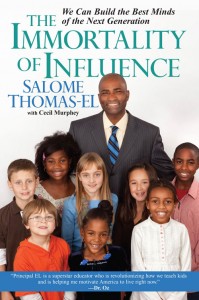|
|
June 9, 2011
by Miranda Paul
Miranda Paul teaches both English and Spanish in Green Bay, Wisconsin. She holds a BA in English and Education from St. Mary’s College of Maryland where she helped launch a student-teacher exchange program in Gambia, West Africa. In her spare time, Miranda is a freelance writer for the University of Southern California’s Masters in Teaching online degree program.
When I began student teaching eight years ago, I didn’t belong to any social media sites. But in less than a year I learned an important lesson: Social media saves students. That first year I had one particularly challenging class among my 9th and 11th graders. The class was difficult because many students were too shy or intimidated to share their opinions. I did my best to encourage them, offering prizes for speaking up, etc., but by the end of my student teaching, only a handful of the most outgoing students had expressed how much they enjoyed my unit on poetry.
I felt I really hadn’t reached all of my students and that I had failed. Then one day, the following summer, I opened a heartfelt three-page email from a former student who rarely spoke in class. She described how, during the school year she had contemplated suicide, but poetry helped her through tough times. She was grateful for a handout I’d given in class, listing poetry forums where kids could post their words online. On those social media sites, she found friends and the confidence to discuss many issues. Her last line summed it up: Poetry saved her life and I had introduced her to poetry. That was powerful. A student who seemed afraid to talk in class wasn’t scared of publishing her words for all to see. Social media had saved a student’s life.
When I landed my first teaching position, I tried to include every technology available to me that would help me reach all of my students academically and developmentally. Student work was scanned and written about on blogs. Both parents and students had my e-mail address on the first day of school. By the next year, I had several students writing their own blogs. Several parents were skeptical – but others were enthusiastic about their child’s increased participation.
Social media is the new language of kids. If we want to reach them, we need to speak their language. But it’s equally important to make ourselves available on their platform so that they are able to reach us. Last week, I spoke to a group of 7th and 8th grade girls about some charity work I do in a small African country. After the presentation, the girls were eager to help with the project. “Are you on Twitter?” one girl asked, pulling out a phone, ready to type. The school day was technically over and parents were ready to leave, but the girls wanted to continue learning and social media would help them do it. I directed her to Facebook (I’m not yet on the Twitter bandwagon…). Because they had a way to reach me, within a few days, my charity more than doubled its Facebook fans.
I’m not the only teacher, student or parent who believes in the power of social media to connect and empower us all. Recent articles in The New York Times provide more convincing evidence of the growing educational and emotional power of social media. I loved reading about how Iowa English teacher Erin Olson used technology like Twitter to increase classroom discussion participation by more than 25%. In another story, retired history teacher Bill Chemerka discovered his impact on students when he found a Facebook fan page called the “Mr. Chemerka Fan Club,” with more than 450 members. Alye Pollack’s YouTube video is yet another example of how social media was the only way Alye felt confident enough to speak up about the issue of being bullied.
Based on my experiences and that of others, I’ll keep social media in mind as I prepare to teach summer courses (I’ve actually requested to teach one of my courses in a computer lab). Of course, as the traditional English teacher I am, I’ll also be bringing plenty of pencils and paper.

November 22, 2010
In a rare but not unprecedented move, we sent our intrepid Time Traveler back to the late 1980s to report on the historic role of parents in their children’s education. What she uncovered may be hard for us 21st Century parents to believe, but we’ve verified her account by cross-referencing it with archival documents as well as first hand reports from today’s Elders and young adults who swear this is the way it was. Her report is excerpted here:
On weekdays during the 1980s, parents kissed their kids goodbye at the front door and sent them out into the world. The children either marched themselves to a bus stop, walked to school or rode a bike (yes they had helmets, though nowhere as cool as the ones we’ve got) From the moment they turned the corner, parents could not directly communicate with their kids.
WARNING: If you find yourself feeling anxious reading the above, we recommend putting your head between your knees and breathing in slowly through your nose and exhaling slowing through you mouth. If that doesn’t alleviate your symptoms, shut down your computer and take a warm bath, with or without bubbles.
All during morning classes, lunchtime, recess, afternoon classes and onsite after school programs, kids were incommunicado. You’re probably wondering, “What if the kid left a lunch, a book or assignment at home? How could Mom or Dad rush to school to help if they didn’t know there was a problem?” The teachers and school administrators of the ’80s had a simple answer for that one: If the kid doesn’t bring something (s)he needs to schoool, then the kid figures it out and deals with the consequences. Period.
Cruel and unusual punishment, granted, but that’s the way it was.
In case you’re shaking your head thinking, “That sounds like a lockdown!” 20th Century schools weren’t entirely lacking compassion. For example, if a kid complained of a headache, (s)he asked the teacher’s permission to go to the office where she’d plead her case to the school nurse and likely be given an opportunity to rest quietly. If the nurse felt the situation warranted it, the school placed a call home or to the parents’ office and the problem was solved. Are they for real?! Think of the precious moments lost using that antiquated system!
 Today, thankfully, we can call and/or text our kids at any time, including 9-3 and we do…often! Yet, apparently, some schools are cracking down on in-class cellphone use. They say the constant ringing and buzzing is a distraction to teachers and any students interested in receiving an education. (What kind of lame excuse is that?) In addition, schools limiting students’ cellphone access also justify it by saying the policy reduces in-class cheating and cyber-bullying. Hmm. Well, maybe we can see some logic there, but who cares?! Schools have no right to prioritize education over a parent’s access to their children. This is the 21st Century, Ms. Principal, and these are Anxious Times. Today, thankfully, we can call and/or text our kids at any time, including 9-3 and we do…often! Yet, apparently, some schools are cracking down on in-class cellphone use. They say the constant ringing and buzzing is a distraction to teachers and any students interested in receiving an education. (What kind of lame excuse is that?) In addition, schools limiting students’ cellphone access also justify it by saying the policy reduces in-class cheating and cyber-bullying. Hmm. Well, maybe we can see some logic there, but who cares?! Schools have no right to prioritize education over a parent’s access to their children. This is the 21st Century, Ms. Principal, and these are Anxious Times.
Your thoughts?

August 8, 2010
 "The Immortality of Influence: We Can Build the Best Minds of the Next Generation" by Salome Thomas-El With the new school year just weeks away, I wanted to interview a superstar educator. Someone who could inspire every adult who lives or works with kids. And we all need inspiration and motivation from time to time, right? Because kids, especially tweens and teens, aren’t always easy to hang in there with. To find the right guest, I went to my local Inspiration and Resource Department (aka Twitter) and I found the man for the job — Salome Thomas-El. He goes by the name of Principal El and for 20 years he’s walked the walk by influencing his students and helping them reach their full potential. Know how he does it? By encouraging kids, non-stop. As Principal El puts it, “I keep letting them know that I believe in them until they’re ready to believe in themselves.”
Principal EL is a regular contributor on “The Dr. Oz Show.” He’s also the author of two best-selling books, I Choose to Stay: A Black Teacher Refuses to Desert the Inner City, about his teaching experience in Philadelphia, and his new book, The Immortality of Influence: We Can build the Best Minds of the Next Generation, which stresses the importance of mentoring, parenting and service to others.
Principal El has a life-long commitment to answering this basic question, “How do we ensure that every child achieves his or her greatest potential?” This question lies at the heart of the current national dialogue on education policy, the day in-and-day out work of school personnel, and the hopes of every parent.
As a parent, you are your child’s #1 Influencer. If you’re ready to have your batteries recharged for all the challenges the new school year will bring, then let’s talk about how to best use the tremendous influence you have with your children. Listen to my interview with Principal El right here:
[QUICKTIME http://www.anniefox.com/podcast/FC017.m4a 300 300 false true]
If you have iTunes, you can subscribe to this podcast in the iTunes Store.
Or, you can download an MP3 version here.
Upcoming guests include:
Dr. Elizabeth J. Meyer, author of Gender, Bullying and Harassment: Strategies to End Sexism and Homophobia in Schools
Dr. Leah Klungness and Rachel Sarah co-founders of SingleMommyhood.com. Dr. Leah is the co-author of The Complete Single Mother. Rachel is the author of Single Mom Seeking: Playdates, Blind dates, and Other Dispatches from the Dating World.
David McQueen, international speaker empowering adults and youth alike on subjects such as leadership, careers and communication skills.
Dr. Karyn Purvis, co-author (with Dr. David Cross, Wendy Lyons Sunshine) of The Connected Child: Bring hope and healing to your adoptive family

| |













